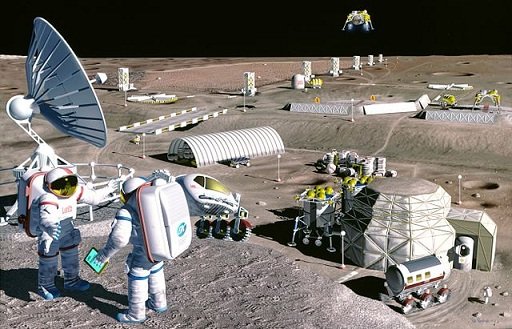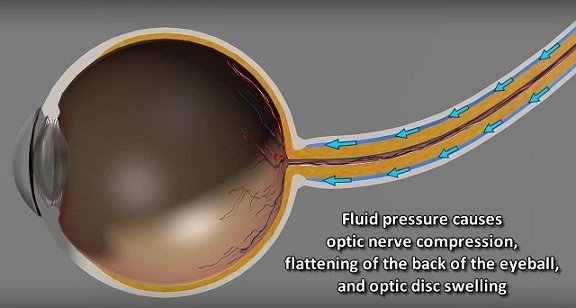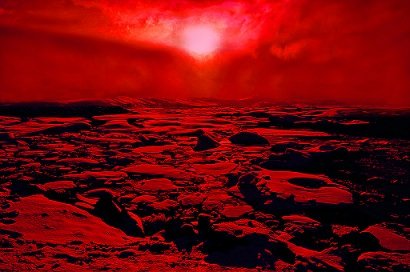What To Expect With humans Becoming Multiplanetary
Introduction
How far have we gone away from the earth? The obvious answer is "moon" - like it was heralded by the Apollo II (the trio of Neil Armstrong, Michael Collins, and Buzz Aldrin) over half a century ago, but just in the 1970s, the Apollo 13 space crew broke another record by moving into the moon's far side [ref] - and that has been how far we've gone since the exploration of space began. But over the years, there have been plans here and there to send humans way beyond that, to maybe Mars. But what would become of us if we start existing in an off-earth habitat and how prepared are we for it?

[Image Source: Wikimedia Commons. Public Domain Licensed]
In the post I wrote about the possibility of multiplanetary existence, we looked at some technological infrastructures that would enable us form an extraterrestrial colony. We also took a look at the downturns in this; which included the cost of hauling stuff to space. But some alternatives were raised to mine the stuff we need in space, instead of transporting them from earth. Brilliant; you may say, but what of the effects of space itself on our own bodies as humans? We would start explaining these effects from the one with the lesser evil; and that's the "effect of space on our height".
Space and height
Let me give us a little assignment to do this night: Before you sleep, take a measurement of your height, then tomorrow morning, immediately you wake from sleep, re-measure your height and compare the result. You'd be very surprised at the result. Obviously, you would add up some micro inches to your height, but don't be too happy yet, your height would revert back to normal in the course of the day. So what da heck causes this increase in height? From your high school biology, you might have already known that our spine has 33vertebrae, and these are interconnected by the intervertebral discs (the work of these discs is to aid in the movement and flexibility of the spine - otherwise, it would just be rigid like a tree trunk.. lol).
Also, we all know that the earth exerts a force (gravitational force) on everything in it, and that is why; when you throw a stone vertically upwards above your head, it would return back and hit your head, lol. And this force also affects the spine - thus, compressing the intervertebral fluid. But when you lie horizontally (during sleep) on the bed or couch, the effect of gravity would cease to have effect on your spin, till you've awoken - and within that time-frame, you may have replenished a very micro fraction of the intervertebral fluid, and adding up to the overall length of the spine. In the same way, when you take a journey from earth to another place with lesser gravitational pull, the exertion of the force on your spine would be minimal, and that would allow for more replenishing of these fluids, and also would lead to more stretching of the intervertebral disc.

[Image Source: Wikimedia Commons. Public Domain licensed]
Have you ever wondered why astronauts return from the space being taller than when they travelled? This is the explanation for it; and since the space has lesser-than-earth gravity, the force on their spine would be reduced. So humans becoming multiplanetary (maybe Martians), we could be way taller than earthlings (assuming we don't go to Jupiter with a very strong gravity to even crush us). Also when a child is born in space, you could guess what height they would turn out to be. Why did I mention "Mars" earlier as the next point-of-call for Extraterrestrial (ET) colonization? Maybe because of the similarity of the earth and the Martian territory. But have you taken time to ask of the gravity there? Okay; it's around 3.711m/s2 [ref]; that's much lower than what we have here - which is not surprising for a smaller-than-earth planet. That means; judging by the gravity of mars in comparison with that of the earth; if you're a 70kg human here, you may not even weigh up to 27kg on mars. So what would you expect with our height if we stay long there? Of course we could breed giants :p
Apart from our height, what else is affected by the effect of reduced gravity? Sometimes ago, we discussed about how space travels could lead to partial or total blindness of the astronauts (you can check out the post for a baseline info).The same effect could be replicated in a Martian colony too. Here on earth, the force of gravity would distribute the cerebrospinal fluid to the parts of the body they're required. But when we're in a place with reduced gravity, the downward force required to do so would not be enough, and that is why the cerebrospinal fluid gets into the body parts they're not welcomed; particularly the areas around the eyes, and exerting pressure on the eyeball, thus, causing them to be defected. Maybe I may have to drop this image here again for us have a clue of what happens within our eyes in space.

[Image Source: Screenshot from YouTube Video. Courtesy of NASA. 40seconds from start]
Away from the force of gravity (or lack of it), and its effect on the human body; we will be considering other things to experience with an extraterrestrial colony - and that is the area of light distribution
Light distribution and solar energy
Still focusing on our case study (the Martian colony) - we're all aware the Mars is at the forth position when coming from the sun. That means; a much reduced solar and radiant energy would be hitting the Martian territory. And of course; with a much reduced atmosphere there, and a micro fraction of greenhouse gases; maybe only CO2 (of course, there hasn't been humans to burn fossil fuels, release smokes, CFCs, and stuff there, lol), so it is not surprising if you wouldn't find much greenhouse gases there.
With all these, imagine how cold the Martian planet could get at night; since there's only little greenhouse gases to retain the heat. How would humans be able to survive in such a bone-chilling and cruel cold? Or maybe we can introduce some greenhouse gases ourselves to get the job done; which could actually be what we need to seed the red planet. This brought to reminiscence the movie I saw sometimes ago; "Martian"; about how it's possible to grow potatoes in the ground of Mars, by artificially inducing an earth-like condition in a confined space - maybe that would work.
Also, still on the area of light distribution; it is expected that mars should be darker than what we experience here - partly due to the distance light has to cover from the sun. But thanks to our body's mechanism, even in dim light, our eyes can adjust favorably, so we would still be able to navigate our ways. But assuming it is absolutely dark (which is impossible), we could evolve with an echolocation ability (just like bat, dolphin, and the dare-devil human; Ben Underwood), and we can also navigate our way through. So we wouldn't be concerned much about the visibility in the Martian colony.

[Image Source: Flickr. Author: Maxwell Hamilton. CC BY 2.0 Licensed]
Another point is: Mars has a longer-than-earth day; which is roughly 25hours ref for a complete rotation round its axis (which is also close to what we have here on earth). But consider it this way: If you spend one year, for example, on mars, on your return back to the earth, you would have skipped some days on earth - how does this make you feel? maybe not bad though. But does it worth it to become multiplanetary with all these risks? Can I ask you a question? How indefinitely do you think that the earth would support human life form? With all the disruptions in the balance of our ecosystem, it wouldn't be too long and our actions would become unbearable for Mother Earth, and it would "crack" under our pressure.
So as it were, our survival could be dependent on our ability to flee and free the earth, and probably take our troubles to mars or somewhere else. Maybe this would shock you; for the fact that the earth has been in existence for a few billion years does not mean that it would not come to an end one day. There have been speculations of cataclysm; of which some have been debunked as being mere conspiracy theory, but in anyway, we shouldn't expect the earth to last eternally. So our multiplanetary abilities would be inevitable, but maybe not anytime soon; maybe the future would decide.
Conclusion
With the exponential growth of the human population on earth, and with the human activities that hamper the balance of our ecosystem greatly, it is only human to begin to think of feasible alternatives in case of the unexpected (or expected; as the case may be). That is why the idea of extraterrestrial colonization comes into the scene, but all these are not without effects; as we've seen; but if we can bear the effects, then we can dare the risks.
Thanks for reading
References for further reading:
- nasa.gov - Journey to mars.pdf
- Effect of space on your body
- Manifesto for martian colony
- Growing taller in space - reasons


gif by @foundation
First of all, let me congratulate you for a well written post. Then, do you really think the idea to explore the possibility of human survival in order planet stemmed from the belief that the earth has a expiry date? Granted that it is truism that the earth has expiry date due to our destructive nature, I really do not think moving into anothe planet will save us.
However, I really don't want to believe scientists are exploring this possibility out of mere fear that the earth might end up being destructed by and large our actions. There are practical measures that can be put in place to at least reverse the destruction, mostly by emitting less pollution and taking care of the environment generally. Moving to other planet is really not an option for the human population.
Lastly, I do not believe that the world is overpopulated. The earth can sustain more population that it is currently holding and the idea of overpopulation is just a political propaganda as far as I am concerned. The main problem that has been pointed out is inadequate resources, the same resources some people are hoarding for unborn generations. Greed is the game, not overpopulation and moving to another planet will never solve our problems. It will probably complicates them
Hey @ummar
Here's a tip for your valuable feedback! @Utopian-io loves and incentivises informative comments.
Contributing on Utopian
Learn how to contribute on our website.
Want to chat? Join us on Discord https://discord.gg/h52nFrV.
Vote for Utopian Witness!
The earth having an expiry date is the least considered factor in the establishment of an ET colony - of course, the earth isn't planning to come to an end anytime soon.
But human nature has always been tilted towards curiosity and experimentation, and that's among the driving forces behind space exploration.
Thanks for the comment
The expiry date is somehow linked to human destroying the earth through their activities. So, you have an idea what I was talking about. I will somehow agree if curiosity is mentioned as the major factor instead of seeking solace in another planet after the anthropological destruction of the earth.
Hmmmmm...
It was an interesting read, will you take me to Mars?
Lets have more time
Why not? We can even do some intergalactic touring. And when we finally come back to Earth, we would have evolved with weird alien features, lol.
Like touch and follow ba
You garrit jare
Surviving in a place like mars will be more complicated with all this problem surrounding it like,the light not being soo bright and with little green house gases. Though there are still some favorable part like growing taller. But it not going to be as good as staying on the earth though we can still adapt. Nice post
Lol. When the earth finally cracks under the human pressure, we may be left with little or no choice at all, but to consider an ET colony.
Thanks for the comment bro
This post has been upvoted by the user-run curation platform CI! In this platform users are able to manually curate content. This is done regardless of Steem Power, for both rewards and vote size calculation.
Join in at our site here!
https://collectiveintelligence.red/
Or join us on discord to interact with the community!
https://discord.gg/sx6dYxt
This post was submitted for curation by: @gentleshaid
This post was given a rating of: 0.9931310249032096
This post was voted: 100%
It's an honour.
And thanks so much to @gentleshaid. I'm grateful
I upvoted your post.
Cheers to you.
@Pinoy
Posted using https://Steeming.com condenser site.
This post has been voted on by the steemstem curation team and voting trail.
There is more to SteemSTEM than just writing posts, check here for some more tips on being a community member. You can also join our discord here to get to know the rest of the community!
Why do we fall..?
So that we can learn to pick ourselves up.